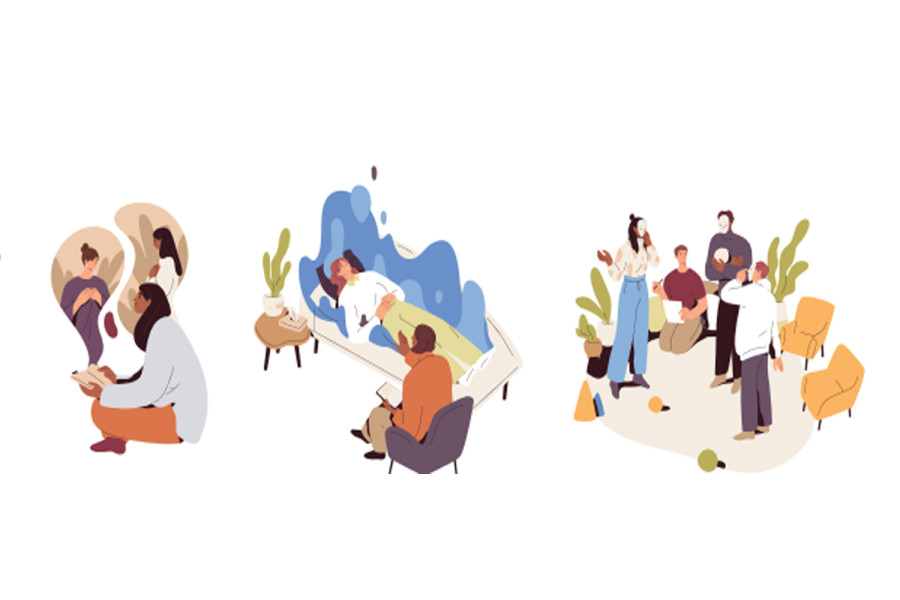Culture & Lifestyle
Mental health disparities in marginalised communities
What is required is acknowledgement of the importance of diverse cultural perspectives.
Dipesh Tandukar
The discussion around mental health often comes with misconceptions about who it affects. Over time, some of these myths have faded away, but in our society, mental health disparities still cast shadows on specific communities. It’s widely acknowledged that mental health issues can impact anyone, regardless of their background. Yet, what’s often overlooked is which groups are more susceptible, and how certain communities may miss out on the necessary resources for a healthy mind.
Our goal is to build a world where everyone, irrespective of their background, can access the support needed to navigate life’s challenges. Unfortunately, this aspiration often remains unrealised. Mental health disparities persist quietly, disproportionately affecting communities that need support the most. Why is that? Why do those who need essential services find it challenging to access them? And why are certain communities more prone to facing mental health challenges?
The answer lies in the intricate interplay of social, economic and cultural factors that shape our lives.
Consider two individuals facing similar stressors—whether it’s workplace difficulties, the loss of a loved one, or relationship issues. Their ability to cope is influenced by the resources available to them. This uneven distribution of support systems is the primary reason for mental health disparities. The environment we grow up in and the people around us significantly impact our mental well-being. In marginalised communities, factors like limited access to quality education, poverty and systemic discrimination create an environment where mental health challenges are more likely to emerge.
Picture an individual growing up in a deprived neighbourhood where schools lack proper resources, job opportunities are scarce, basic needs go unmet, and discrimination is an everyday reality. In such a setting, this person is likely to have low self-esteem and uncertainty about their future achievements. This prompts us to ponder the impact of these circumstances on the individual’s mental health. Without access to affordable counselling or support, they may grapple with anxiety, depression and other challenges—a common situation for many facing similar circumstances. It’s not just about personal resilience; it reflects the systemic barriers that can impede mental well-being.
Now, imagine an alternate reality where these individuals have access to quality education, economic opportunities and a supportive community. The mental health of these individuals could take a different turn. While mental health can still affect anyone, the likelihood of problems and access to services, when needed, can significantly reduce their impact on our lives and well-being. Shouldn’t this be the standard we all aspire to in our community?
Amid the challenges, there’s optimism in instances where communities unite to break the chains of mental health disparities. This is particularly true for marginalised communities, which exhibit incredible strength, unity and resilience. In such communities, grassroots organisations offering free mental health workshops can be highly effective, empowering individuals with coping mechanisms and fostering a sense of community. This creates a ripple effect that enhances individual well-being and positively influences the entire community. Although there may be stigma and stereotypes linked to mental health services, engaging with the community and communicating with its residents can help dismantle the barriers preventing people from seeking the help they deserve.
Navigating the complexities of mental health disparities requires acknowledging the importance of diverse cultural perspectives in mental health care. Each community views well-being uniquely, and a one-size-fits-all approach falls short. Personalised support is essential, respecting varied perspectives and values while meeting the necessary standards in mental health interventions.
In times of difficulty, everyone may need help, and those fortunate enough to receive it promptly are well-supported. But what about those individuals or communities unable to access the help they require? For them, the challenges may be considerably tougher. It’s not a matter of comparing struggles; it’s about understanding and empathising. Recognising that everyone should have access to the support they need for good mental health, especially when it’s needed the most. As a society, we must collaborate to dismantle barriers and create an inclusive environment that fosters the well-being of all.




 14.24°C Kathmandu
14.24°C Kathmandu



.jpg&w=200&height=120)











